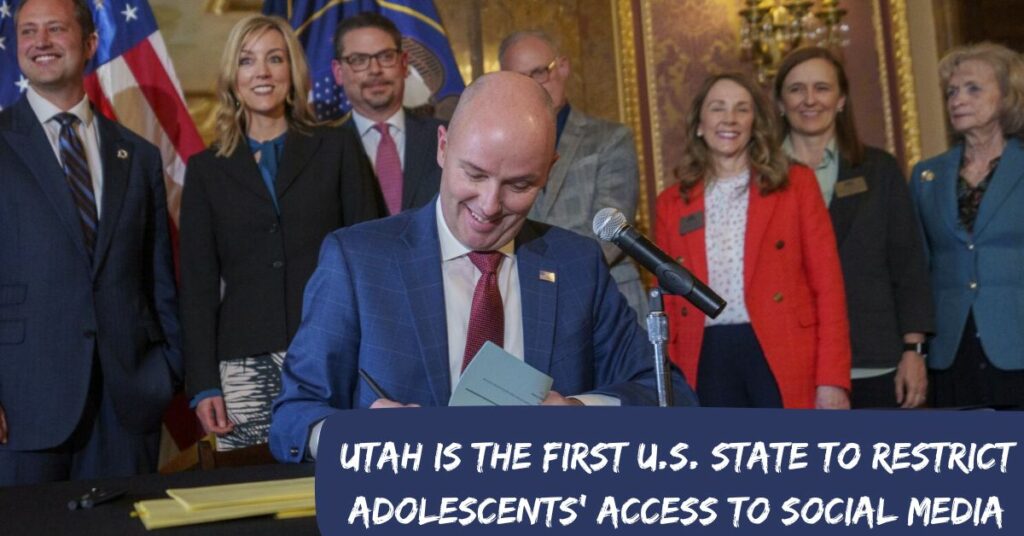The governor claimed he signed the two sweeping bills in an effort to safeguard the state’s youth. Parental access to their children’s online content, including postings and direct messages, will be expanded under the proposed legislation.
Much anxiety has been raised about the potential negative effects of social media on the mental health of youngsters, prompting this action. Under the new rules that went into effect on Thursday, minors will require their parents’ or guardians’ permission before they can sign up for social media accounts like Instagram, Facebook, or TikTok.
The proposals also impose a social media curfew that prevents children from using the sites between the hours of 22:30 and 06:30. It is the goal of the new law to prevent social media platforms from collecting or using children’s personal information for advertising purposes.
Two bills that go into effect on March 1, 2024, aim to make it simpler to file lawsuits against social media platforms. Republican Governor Spencer Cox tweeted,
“We’re no longer willing to let social media firms continue to hurt the mental health of our youngsters.”
“As leaders, and parents, we have a responsibility to protect our young people.”
The governor’s decision to restrict some of the most addicting features of social media was hailed as a “huge victory for kids and families in Utah” by the children’s advocacy group Common Sense Media.
According to Common Sense Media’s founder and CEO Jim Steyer, “It adds momentum for other states to hold social media companies accountable to ensure kids across the country are protected online.”
Activate more of your brain: If you’re looking for more interesting reading, check out the links below:
- Blue Valley North Students Threatened by Teen on Social Media, Teen Arrested
- Model and Social Media Star Jeff Thomas has Died at the Age of 35
- Delphi Murder: Judge Dismisses Five Charges Against Man With Social Media Profiles In Case
Four additional states with Republican governors are considering rules similar to New Jersey’s, including Arkansas, Texas, Ohio, and Louisiana. But, advocacy groups like Common Sense Media have voiced concerns that the new legislation could put children in danger.
We’re no longer willing to let social media companies continue to harm the mental health of our youth. Today we signed two key bills in our fight against social media companies into law:
➡️ SB152 requires social media companies to verify that users in https://t.co/GVAcSi9zHx… pic.twitter.com/M1Kbya1xQi
— Utah Gov. Spencer J. Cox (@GovCox) March 23, 2023
TechFreedom’s counsel for free expression, Ari Z. Cohn, expressed concern over “serious free speech difficulties” created by the bill.
“There are so many children who might be in abusive households,” he told the BBC, “who might be LGBT, who could be cut-off from social media entirely.”
Meta, Facebook’s parent company, responded by saying the social media platform takes child safety very seriously. A spokesperson told the BBC:
“We’ve developed more than 30 tools to support teens and families, including tools that let parents and teens work together to limit the amount of time teens spend on Instagram, and age verification technology that helps teens have age-appropriate experiences.”
Several bills in the United States aimed at safeguarding children from harmful content on social media have had bipartisan support. At his State of the Union address in February, Vice President Joe Biden argued for legislation to prevent digital companies from collecting data on children.
California legislators approved a kid data law late last year. The California Age-Appropriate Design Code Act mandates, among other things, that platforms cater to users under the age of 18 by defaulting to the most stringent privacy settings available.
The passing of the Utah legislation follows a scathing grilling of TikTok CEO Shou Zi Chew by members of Congress.
You Won’t Be Left Too Far Behind The California Examiner can be easily accessed at any time by adding it to your favorites.
